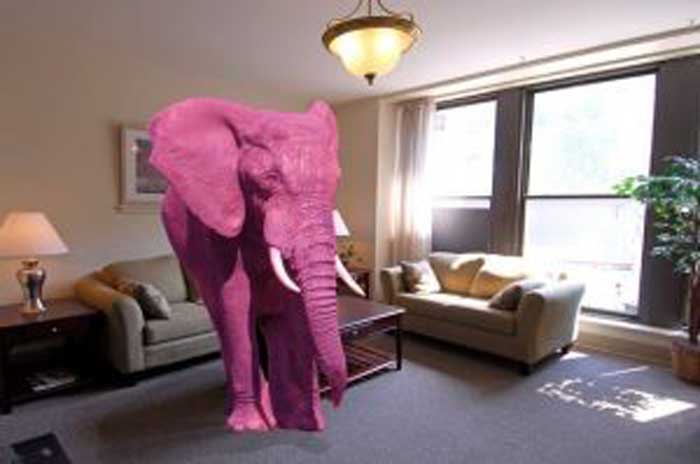
The Fiddler You certainly don’t want a bull marauding through your china shop smashing all the china. But is it alright for you to have an elephant in your living room? Or do you see pink elephants?
Let us start with the expression, “Seeing pink elephants”. This expression refers to the drunken hallucinations of an alcoholic. My mate Wikipedia gleefully informs us, “For many decades before ‘pink elephant’ became the standard drunken hallucination, people were known to ‘see snakes’ or ‘see snakes in their boots.’ Beginning in about 1889, and throughout the 1890s, writers made increasingly elaborate modifications to the standard ‘snakes’ idiom. They changed the animal to rats, monkeys, giraffes, hippopotamuses or elephants — or combinations thereof; and added color — blue, red, green, pink — and many combinations thereof.”
Now, what of the expression “an elephant in your living room”? If a large elephant stomped into your living room you would definitely notice this. The expression “an elephant in your living room” is not to be taken literally. Rather it is a metaphor for a situation where everyone in the living room knows about “an important topic, question, or controversial issue but no one mentions or wants to discuss it because it makes at least some of them uncomfortable and is personally, socially, or politically embarrassing, controversial, inflammatory, or dangerous.” The topic is best avoided if it generates disagreement, such as race, religion, politics, homosexuality, mental illness, or suicide. Where the topic is alcohol abuse, the expression may be expanded to, “the pink elephant in the room.”
We turn now to the topic of the rights of elephants. “Happy” is presently incarcerated in the Bronx Zoo in New York City. Happy was born in the wild in Asia in the early 1970s, captured and brought as a one-year-old to the USA. She arrived at the Bronx Zoo in 1977 with Grumpy, a fellow elephant who was fatally injured in a 2002 confrontation with two other elephants. Happy is now 51 years old.
An animal rights organisation recently brought a court action on behalf of Happy. It argued that Happy should be recognised as a legal person and be afforded the rights of a person. Like any other peers, on Happy had a right to liberty. Her right to liberty was being violated by keeping her in a confined space at the Zoo in an unnatural habitat for her. Happy was an autonomous, cognitively complex elephant worthy of the right reserved in law for “a person”. The organization, therefore, applied for habeas corpus to secure Happy’s liberty so that she could be sent to a spacious animal sanctuary that would respect her rights. The zoo said Happy was being well looked after and it warned that a win for the animal rights organization could open the door to more legal actions on behalf of animals, including pets, farm animals and other species in zoos.
The majority of the court of appeal rejected the application. It decided that although elephants are intelligent beings deserving of proper care and compassion, a writ of habeas corpus was intended to protect the liberty of human beings and did not apply to nonanimals like Happy. Personhood was a legal designation that indicated an entity had the capacity for rights or responsibilities. Granting legal personhood in a case like this would affect how humans interact with animals. “Indeed, followed to its logical conclusion, such a determination would call into question the very premises underlying pet ownership, the use of service animals, and the enlistment of animals in other forms of work.” One of the judges recalled the appalling case of Ota Benga, a member of the Mbuti pygmy people who was kidnapped from Africa and placed on exhibit at the Bronx Zoo in 1906, attracting a quarter of a million visitors. The difference in that case was that Benga was a human person.
Two judges of appeal dissented. They decided that the fact that Happy is an animal does not prevent her from having legal rights. Happy was being held in “an environment that is unnatural to her and that does not allow her to live her life”. “Her captivity is inherently unjust and inhumane. It is an affront to a civilized society, and every day she remains a captive – a spectacle for humans – we, too, are diminished”. The judges rejected the notion that habeas corpus applied only to humans, arguing that the writ was “vigorously used to challenge the detention of slaves when, under law, they were deemed chattels.”
The Fiddler is most disappointed by the majority decision in this case and sincerely hopes that our own constitutional court would adopt a more progressive and enlightened approach if such a case was brought before it for determination. Let alone anything else, refusal to accept that an animal has rights equivalent to that of a person prevents lawyers from asserting the rights of various members of the animal kingdom.
- Chamisa under fire over US$120K donation
- Mavhunga puts DeMbare into Chibuku quarterfinals
- Pension funds bet on Cabora Bassa oilfields
- Councils defy govt fire tender directive
Keep Reading
It would mean that they could not maintain that cows have an absolute right to life and all abattoirs must be closed immediately. So too, they would be precluded from arguing that the holding of pigs in disgusting sties violated their right not to be subjected to cruel and unusual conditions of incarceration.
And what about the rights of donkeys? Should people be allowed to continue to force them to pull heavily-laden donkey carts in flagrant violation of their labour? And what of dogs and cats? Why should people be able to own them as if they were chattels and should they be forced to pretend they are cute and that they don’t have utter contempt for their “owners”? Should chickens not be entitled to bring charges of theft against the persons who steal their eggs? Should sheep not be able to share in the proceeds from the wool shorn from their bodies? Should lions not be able to kill their prey without being witnessed by pesky tourists? Should pink elephants not be entitled to be recognised when they come into our lounges?
There is, however, a downside of granting personhood to animals. We certainly do not want animals to have to suffer all the physical and mental miseries that accompany the human conditions.
Then there is “anthropomorphism” which is the attribution of human traits, emotions, or intentions to animals; in stories the animals are not human but they behave like humans. What arrogance is this?
It is important at this juncture to point out there was a time when animals were held responsible for their own misbehaviour. During the Middle Ages in Europe, animals were considered responsible for sexual offences committed upon them by human beings and were even tortured to elicit groans which were accepted as confessions.
In 1450 a man and a mare were accused jointly of bestiality. The man was found guilty and executed, but the mare was acquitted on the grounds that she had not consented to the act.
In 1386 a sow, its legs mutilated and dressed in human clothing, was hanged at Alaise for biting a child.
In 1389 a horse was hanged for killing a man at Dijon.
In 1454 the Bishop of Lausanne initiated legal proceedings against leeches that had infected the water at Berne.
In 1457 at Lavegny a sow and her six piglets were tried for the murder of a child who, it was claimed, they had killed and eaten.
The sow was found guilty and condemned to death, but the piglets were acquitted because they were considered too young to know what they were doing.
In 1474 a cock was burned for having committed a crime against nature by laying an egg.
It’s time for “Happy” to be happy again and for lawyers to be happy by making lots of money out of animal rights cases.
- Feedback: the [email protected]











